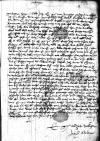Said ich E(uer) G(naden) am jungst(en) ⌊⌋, hab ich ain ⌊⌋ von E(uer) G(naden) empf(angen) dess datt(um) ⌊Brussel⌋ 21 noff(em)br(is), dar inn E(uer) G(naden) gesonthait und wol mig(en) / mit froden vernomen. / Des gleichen wist mich auch Gott hab lob der bestet(en) lang. / Ich bin kurtzlich ettlicher geschefft halb her gen ⌊Sivillia⌋ kom(en), wird bald wider am hoff in ⌊Cast(ili)a⌋ und mich fertig mache(n) gar her aus zu reitt(en) / v(er)hoff auff Ostern oder bald darnach an ⌊kay(serlicher) m(aieste)t⌋ hoff zu sein / alda E(uer) G(naden) zu find(en) / und um das ich so bald v(er)hoff zu E(uer) G(naden) zu kome(n). Kriech ich mit disem dest kurtzer ab / geschiecht diss allain / um(m) ich brieff von ⌊Herna(n) Cortes⌋ empf(angen) hab / damit ainer an E(uer) G(naden) / den schick ich mit diss. / W(ir)t dar inn v(er)nem(en) / ich im E(uer) G(naden) halb geschriben hab / wenn im E(uer) G(naden) wider schr(eibe)n wil / mich die brieff an ⌊Albrecht Con⌋ gesant w(er)d(en). Er schreipt mir sonst nuyer zeittung halb / was er im will(en) hatt aus zu richt(en) / copia des selben brieff schick ich dem v(on) Ehinger den mag er E(uer) G(naden) sechen lass(en) / auch dem s(e)nor ⌊Cornelis⌋ wa er v(er)handen ist / bis ich wais wa er sich befindt wird ich im nit sch(reiben) dan ich in lang auch kain br(ieff) von im empf(angen) hab. /
Die victoria, so ⌊k(önigliche) m(aiste)t⌋ von ⌊Polnn⌋ wider sein feindt gehapt, / hab ich geren gehörtt / Gott hab lob / der well es alweg also v(er)folg(en) lasss(en) / ich wird in E(uer) G(naden) name(n) dem ⌊Hernan Cortes⌋ auch ain druck darvo(n) zu schick(en). In diss land(en) ist nichs nuys v(er)hand(en) / dan man vil sagt von der zeittong aus dem ⌊Schweitzer land⌋. / Gottt geb bald ain ainigkait und recht(en) refomazio(n) in der (christ)enhait gemacht w(er)d. / Ob wais nuys daussen v(er)handen ist / bitt ich E(uer) G(naden) mir mit zu tail(en) und schr(eibe)n dan bis 11-o febrer und nit lengenr wirt ma(n) mich an der ⌊kay(serlichen) m(aiestet)⌋ hoff find(en). Wais E(uer) G(naden) sonst auff diss mal nichs sonders zu schr(eibe)n / dan hie mit ain br(ieff) von ⌊Isabel Dalgada⌋ mir geschr(ibe)n, / dar inn v(er)neme(n) migt / das weil und ⌊k(ayserliche) m(aieste)t⌋ frisch und gesond ist / damit winsche paper damaged⌈[e]e paper damaged⌉ ich E(uer) G(naden) ain gluckhafftig nuy selig jar. /


 AAWO, AB, D.67, f. 4v
AAWO, AB, D.67, f. 4v